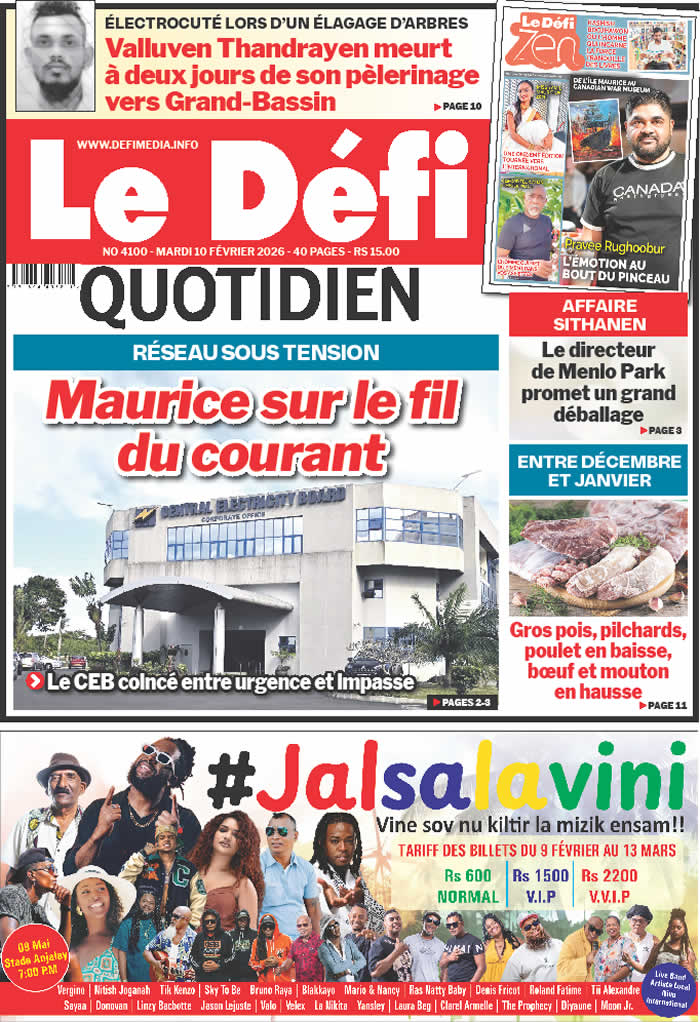
The Monetary Policy Committee will meet this Friday. Its decision will be a non-event, not because the status quo on the Key Repo Rate is largely expected, but because the most important thing is what happens outside MPC meetings. Yet, even if headline inflation is down, the MPC members will have to factor in the inflationary nature of the forthcoming electioneering budget. “It is a time for fiscal responsibility, not lavish spending,” says a political commentator in News on Sunday. But a government that is desperate to regain political ground will care about the general elections, not the economy.
A participant to our survey, forecasting another rate cut, explains that “in this electoral period, because the government has no fiscal incentives to offer, I will not be surprised if it uses monetary policy to try to win a few votes.” This tells a lot about the negative perception one can have of the so-called independence of the Bank of Mauritius. However, it is unsure whether a slash in interest rate at this juncture will be popular among voters. It may please the industry captains, but they are not asking for it.
What they are shamelessly demanding instead is a lowering of the corporate tax rate to 5%, as if the current 15% is not low enough! To quote the same survey respondent, “if one takes the Semdex as an indicator of what exactly constitutes the Mauritian corporate sector, such a measure would mostly benefit the companies listed on the stock exchange and their shareholders. Moreover, if one analyses the shareholding structures of most of these listed companies, it becomes obvious that the relationship between these companies are incestuous through cross-shareholding and that their shareholders are mostly the same persons. Thus, a reduction of the corporate tax rate would only benefit a few, especially that there is no evidence that the corporates themselves would increase investments. They would rather increase dividends payments. It would be foolish to reduce taxes for corporates as the fiscal gap would only widen and would have to be compensated by increases in taxes on imported goods and services, which would fuel inflation.”
Another analyst concurs with the view that “corporate tax cuts will not bring higher investments from the private sector. What is needed is the creation of a state-backed growth capital funding ecosystem and equity funding for medium-sized firms that have the potential to break away from their current state and to scale up. Government must also introduce job guaranty and reskilling schemes, as well as income subsidies to reduce the cost of labour.”
Many private firms are struggling against a prolonged economic slowdown. The manufacturing sector, crippled with debts, continues to register paltry growth rates, from 0.1% in 2015 to 0.7% in 2018. Small and medium enterprises are under-capitalised, fail on governance issues and have no cash to invest. The few large companies that have decent cash flow do not venture beyond real estate, for they are interested solely in projects where return on capital exceeds cost of capital. No economic diversification is taking place.
We must therefore open up our economy and make it attractive for start-ups to come here. It will be necessary to have a start-up ecosystem that backs them. Foreign entrepreneurs should be reassured that our government means business. Amending the Immigration Act to destroy one person in particular can only scare off investors when Mauritius needs immigrants to grow its workforce.
Off-budget state actions can exert more influence on the economic environment than budgetary measures. Policy advisers wrongly believe that just injecting public money in the economy will do the trick. The government has spent so much over the last four years that it has no fiscal space now to boost up the economy. Since the bulk of public spending goes to salaries of civil servants, pensions and interests on debt, there is nothing the finance minister can do beyond symbolic gestures. The fiscal situation will worsen as foreign grant money dwindles away.
Alternatively the government can generate revenue through a sovereign wealth fund. To that end, the Mauritius National Investment Authority should be modelled on the Government of Singapore Investment Corporation to operate on the principle of independence and accountability. It should have different mandates for managing a sovereign fund, the NPF/NSF funds and a portion of the official foreign reserves. If it is properly set up with seasoned professionals, rather than with political nominees, the consolidated investment authority is likely to perform well and pay out dividends to the government. The income received should be used to finance capital expenditure.
As the fiscal policy is constrained, can an expansionary monetary policy support economic growth? One can surmise that the level of the Repo rate is not consistent with the desire of Governor Googoolye to depreciate the rupee without weakening the balance sheet of the Bank of Mauritius. The latter has drastically reduced its purchases of foreign currencies because it does not want to show higher losses. Bank treasurers have been told to adjust the rupee-dollar rate higher, but they cannot go against the dynamics of supply and demand.
The rupee is moving along with the euro-dollar rate. Pushing the rupee down by more than the degree of depreciation of the euro against the dollar requires the largest buyer on the domestic foreign exchange market, i.e. the Bank of Mauritius, to step in and be ultra-aggressive. But then the central bank will run the risk of falling in a negative equity position, and the government will have to recapitalise it according to the law.
True, the central bank is not a normal company with limited cash. It can create money to buy government bonds, which are not accounted for as debt because it forms part of the state. But like the government, it cannot afford to be unpopular.
 J'aime
J'aime














